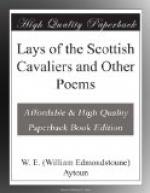In the mean time, troops were gradually and cautiously advanced to the confines of the Highlands, and, in some instances, actually quartered on the inhabitants. The condition of the country was perfectly tranquil. No disturbances whatever occurred in the north or west of Scotland; Locheill and the other chiefs were awaiting the communication from St. Germains, and held themselves bound in honour to remain inactive; whilst the remainder of the royalist forces (for whom separate terms had been made) were left unmolested at Dunkeld.
But rumours, which are too clearly traceable to the emissaries of the new government, asserting the preparation made for an immediate landing of King James at the head of a large body of the French, were industriously circulated, and by many were implicitly believed. The infamous policy which dictated such a course is now apparent. The term of the amnesty or truce granted by the proclamation expired with the year 1691, and all who had not taken the oath of allegiance before that term, were to be proceeded against with the utmost severity. The proclamation was issued upon the 29th of August: consequently, only four months were allowed for the complete submission of the Highlands.
Not one of the chiefs subscribed until the mandate from King James arrived. That document, which is dated from St. Germains on the 12th of December 1691, reached Dunkeld eleven days afterwards, and, consequently, but a very short time before the indemnity expired. The bearer, Major Menzies, was so fatigued that he could proceed no farther on his journey, but forwarded the mandate by an express to the commander of the royal forces, who was then at Glengarry. It was therefore impossible that the document could be circulated through the Highlands within the prescribed period. Locheill, says Drummond of Balhaldy, did not receive his copy till about thirty hours before the time was out, and appeared before the sheriff at Inverara, where he took the oaths upon the very day on which the indemnity expired.
That a general massacre throughout the Highlands was contemplated by the Whig government, is a fact established by overwhelming evidence. In the course of the subsequent investigation before the Scots Parliament, letters were produced from Sir John Dalrymple, then Master of Stair, one of the secretaries of state in attendance upon the court, which too clearly indicate the intentions of William. In one of these, dated 1st December 1694,—a month, be it observed, before the amnesty expired—and addressed to Lieutenant-Colonel Hamilton, there are the following words:—“The winter is the only season in which we are sure the Highlanders cannot escape us, nor carry their wives, bairns, and cattle to the mountains.” And in another letter, written only two days afterwards, he says, “It is the only time that they cannot escape you, for human constitution cannot endure to be long out of houses. This is the proper season to maule them, in the cold long nights.” And in January thereafter, he informed Sir Thomas Livingston that the design was “to destroy entirely the country of Lochaber, Locheill’s lands, Keppoch’s, Glengarry’s, Appin, and Glencoe. I assure you,” he continues, “your power shall be full enough, and I hope the soldiers will not trouble the Government with prisoners.”




